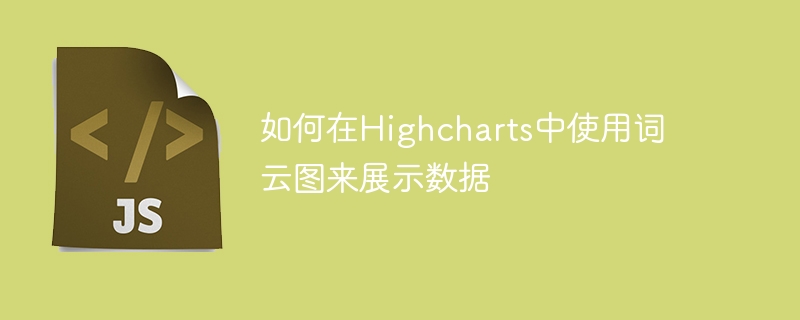

How to use word cloud charts to display data in Highcharts
Introduction:
In the process of data visualization, word cloud charts are a commonly used chart type. It can visually display the importance of each data item, and express the differences between the data through the size and color of the text. In this article, we will introduce how to use word cloud charts to display data in Highcharts and provide corresponding code examples.
1. Introduction to Highcharts word cloud chart
Highcharts is a very popular JavaScript chart library that supports a variety of chart types, including word cloud charts. Through Highcharts' API and configuration options, we can easily create beautiful word cloud charts and personalize them.
2. Data preparation
Before using Highcharts to create a word cloud chart, we first prepare the data that needs to be displayed. Usually, the data of a word cloud chart is an array containing multiple objects. Each object has two attributes: name represents the content of the word, and value represents the weight of the word. For example:
var data = [
{ name: '苹果', value: 12 },
{ name: '香蕉', value: 10 },
{ name: '橘子', value: 6 },
{ name: '葡萄', value: 8 },
// ...
];3. Create a basic word cloud chart
Before creating a word cloud chart, we need to introduce the Highcharts library file. Then, create an HTML container to host the word cloud chart:
<div id="container" style="width: 800px; height: 600px;"></div>
Next, we use Highcharts’ chart() method to create a basic word cloud chart:
Highcharts.chart('container', {
series: [{
type: 'wordcloud',
data: data
}],
title: {
text: '词云图示例'
}
}); Above In the code, the series attribute specifies the chart type as a word cloud chart and passes the data in.
4. Personalized settings
After creating the basic word cloud chart, we can make some personalized settings to make the chart more attractive. Here are some commonly used personalization settings:
Font color and size:
Highcharts.chart('container', {
series: [{
type: 'wordcloud',
data: data,
style: {
fontFamily: 'Impact',
color: 'rgba(0,0,0,0.85)'
}
}],
// ...
});Font rotation angle:
Highcharts.chart('container', {
series: [{
type: 'wordcloud',
data: data,
rotation: {
from: 0,
to: 90,
orientations: 4
}
}],
// ...
});Random sorting:
Highcharts.chart('container', {
series: [{
type: 'wordcloud',
data: data,
shuffle: true
}],
// ...
});The above are just some examples of personalized settings. By adjusting the corresponding attributes, we can make more customizations according to actual needs.
Conclusion:
This article introduces how to use word cloud charts to display data in Highcharts, and provides corresponding code examples. I hope that readers can use the guidance of this article to master the basic methods and personalized settings of using Highcharts to create word cloud charts, and further improve the effect of data visualization and user experience.
The above is the detailed content of How to use word cloud charts to display data in Highcharts. For more information, please follow other related articles on the PHP Chinese website!




